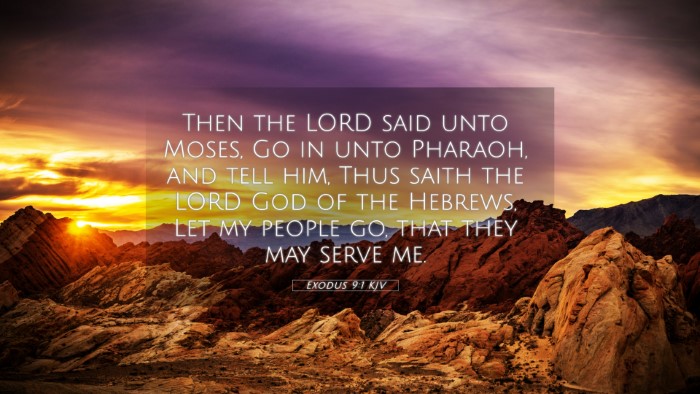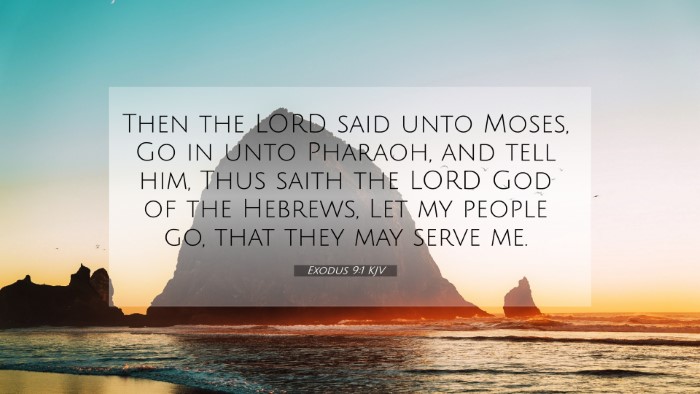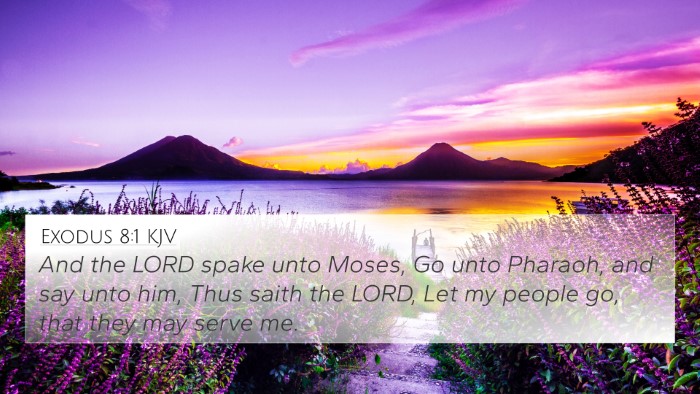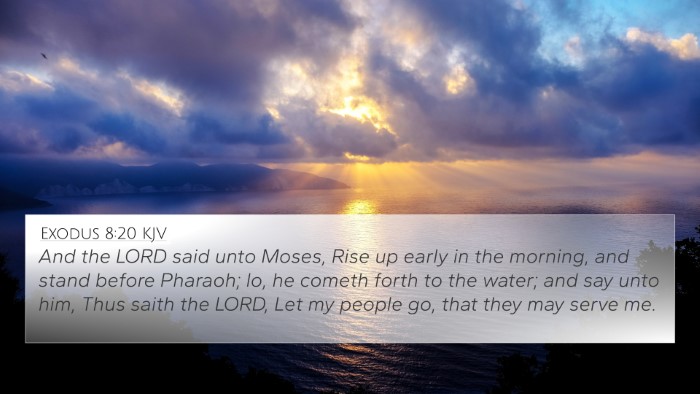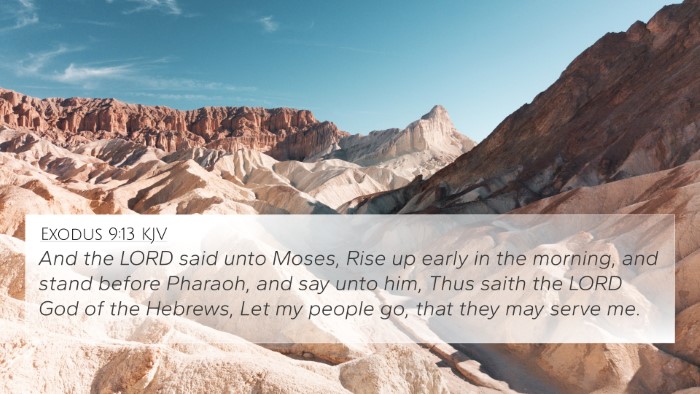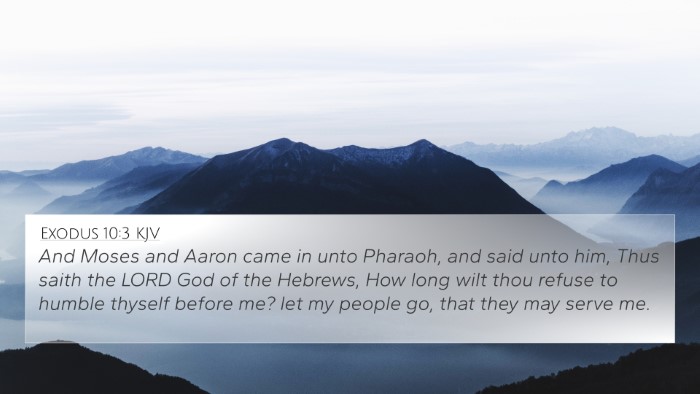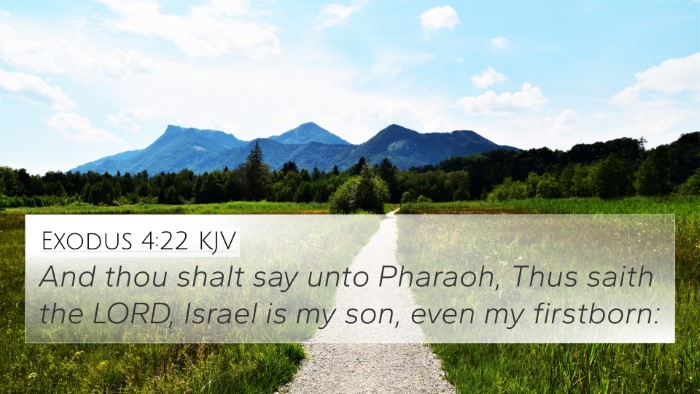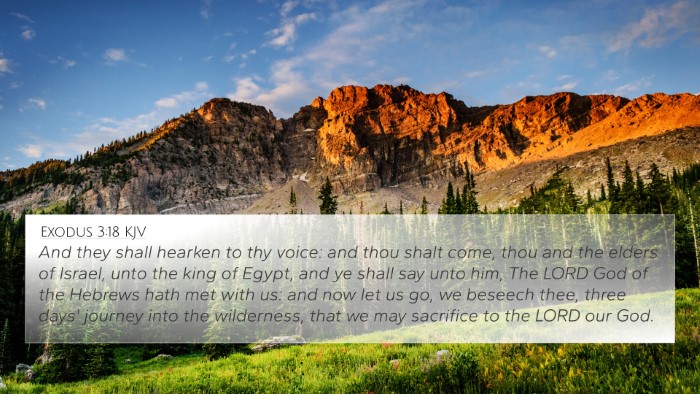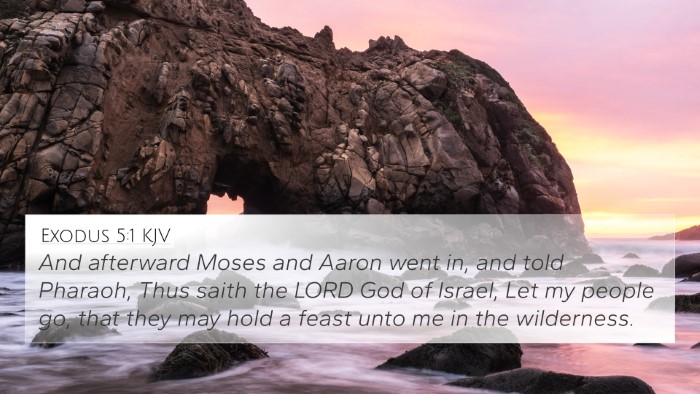Understanding Exodus 9:1
Exodus 9:1 states, "Then the LORD said unto Moses, Go in unto Pharaoh, and tell him, Thus saith the LORD God of the Hebrews, Let my people go, that they may serve me." This verse marks a significant moment in the narrative of Israel's exodus from Egypt, showcasing the Lord's command for liberation and worship.
Verse Analysis and Meaning
The command given to Moses represents the ongoing struggle between divine sovereignty and human authority. The act of confronting Pharaoh is indicative of God's supreme power as the God of Israel, emphasizing His desire for His people to worship Him freely.
Thematic Connections
This verse can be seen as a pivotal thematic link in the broader narrative of liberation, divine authority, and worship in the Bible. Below are thematic connections drawn from public commentaries:
- God's Sovereignty: Commentary by Matthew Henry emphasizes that God is in control of history and uses His prophets to enact His will.
- Moses' Role: Albert Barnes notes that Moses is the chosen vessel to convey God's message, showcasing obedience and faith in the face of adversity.
- Free Worship: Adam Clarke highlights that the essence of the command is to enable Israel to worship God without hindrance, underlining the importance of spiritual freedom.
- Judgment and Mercy: Henry also points out that the plagues are a demonstration of God’s judgment on Egypt’s oppression of His people, balanced by His mercy in providing a means for their deliverance.
Cross-Reference Insights
Exodus 9:1 resonates with several other biblical texts that enrich its understanding. Here are relevant cross-references:
- Exodus 3:10: The initial call of Moses to lead the Israelites out of Egypt.
- Exodus 5:1: Moses and Aaron's first encounter with Pharaoh's refusal to release the Israelites.
- Isaiah 43:1-2: God declaring His protection over His people as they journey towards freedom.
- Romans 8:21: A parallel regarding the liberation of creation from bondage, echoing the need for divine salvation.
- 1 Peter 2:9: Referring to believers as a royal priesthood, called to declare God’s praises, akin to Israel’s calling to worship.
- Psalm 105:26-36: A recount of God's deliverance through plagues, reminding readers of His power and faithfulness.
- Acts 7:34: Stephen referencing God's call to Moses, reinforcing the prophetic mission.
- Hebrews 11:27: Moses' faith in God’s promises during his confrontation with Pharaoh.
- Revelation 18:4: An echo of God’s call to come out of spiritual bondage, relating to the theme of liberation.
- John 8:36: "If the Son therefore shall make you free, ye shall be free indeed," reflecting the ultimate freedom offered in Christ.
Comprehensive Understanding of Cross-Referencing
Utilizing cross-referenced themes can enhance one's understanding of Exodus 9:1. Tools for Bible cross-referencing aid in recognizing connections between scripture, expanding on how different verses relate to one another and the overarching narrative of redemption. For instance:
- Bible concordance can help locate themes of freedom and worship across the Old and New Testaments.
- A cross-reference guide allows for a systematic approach to tracing similar themes and messages within scripture.
- Using cross-reference Bible study can deepen your understanding of the inter-linkages between verses, offering insight into God's consistent character.
Conclusion
In summary, Exodus 9:1 is not merely a historical account but a declaration of God’s desire for His people's freedom to worship. By examining this verse through the lens of various commentaries and cross-references, one can grasp the significance of God's powerful call throughout scripture. Engaging in thematic Bible verse connections and comparative Bible verse analysis will further reveal the depth of God's liberating work across all of scripture.

